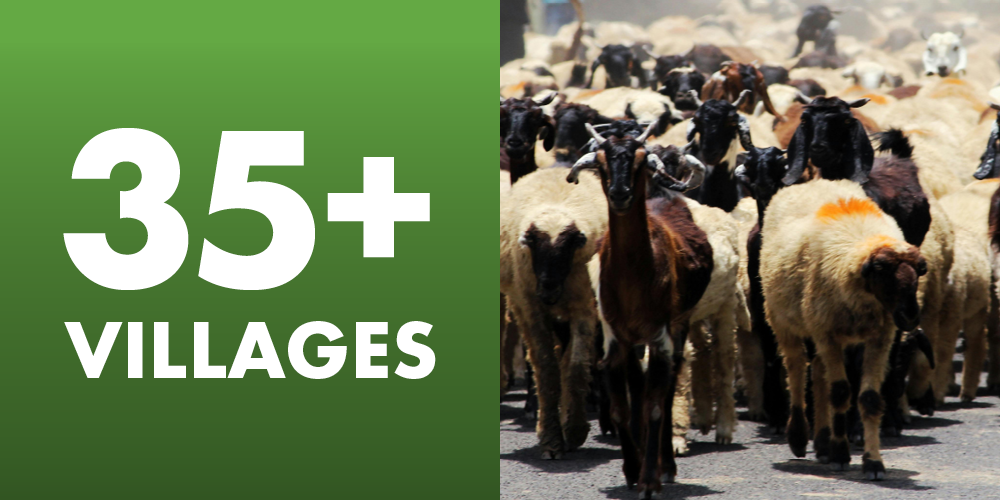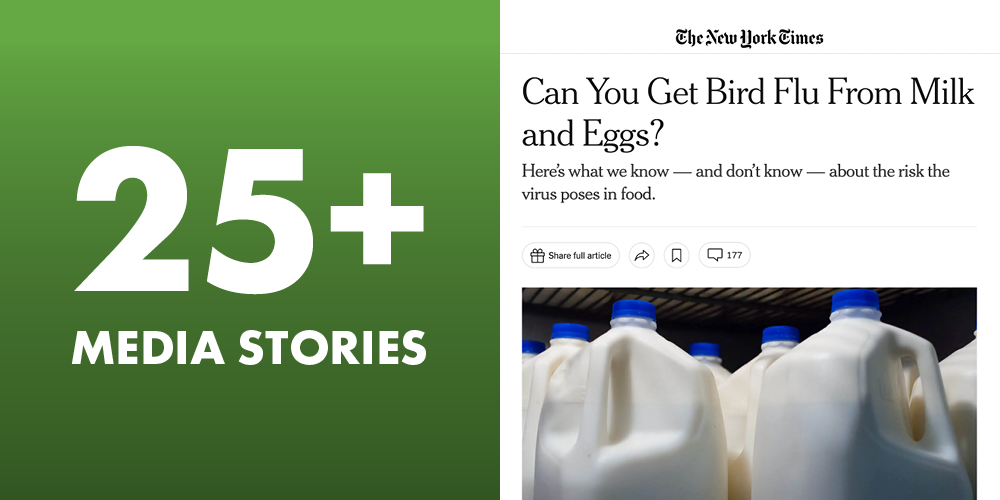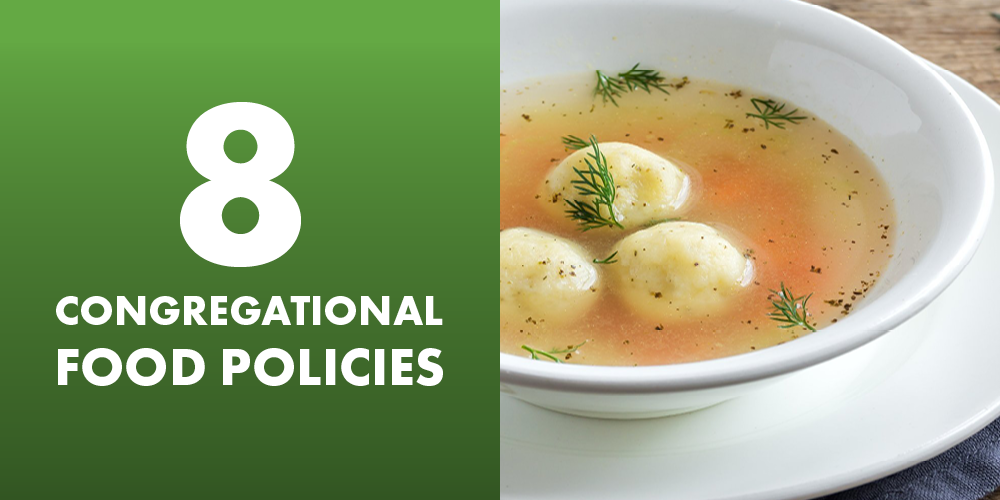Letter from the Executive Director
In my last dispatch, I wrote about Farm Forward’s ongoing commitment to holding the meat industry, retailers, and policymakers accountable to most Americans’ desire for a healthy and humane food system. We’ve always known that accountability for the meat industry will only be possible when a meaningful percentage of Americans not only recognize its harms, but also demand that institutions hold them accountable.
Building the will to end factory farming requires that we find ways to make issues of factory farming—which have historically been both physically and socially hidden from the public—inescapable. In this report, which covers Farm Forward’s successes in 2023 and 2024, I am pleased to share our unprecedented success in raising the public exposure of factory farming and its impacts on animals, the climate, public health, conscientious consumers, and more humane farmers.
Over the past two years, Farm Forward’s work has received the kind of strong media coverage that can truly change minds, including front-page coverage in the New York Times describing our investigation into how taxpayer money bails out the meat companies that exacerbate pandemic risk, and an extensive feature on our humanewashing investigation in The Atlantic that became the most shared story on its homepage. These, along with dozens of other stories in mainstream outlets, demonstrate that we can make factory farming issues compelling to more and more of the American public. Along with much of our other work to build the will to end factory farming, these successes yielded both immediate results and contributed to growing energy to address the harms of industrial animal agriculture.
The most recent consumer research makes clear that the public can be—and in meaningful ways already is being—roused to action against factory farming. This growing public opposition to industrial farming remains statistically small but it expands whenever people are exposed to compelling narratives about the true danger and squalor of factory farms. To change policy as aggressively as is needed, we must stay the course and continue the successful but incomplete work of building a critical mass of public opposition to factory farming.
The urgency and saliency of the dangers factory farms pose shifted in 2023 and 2024 as a result of avian influenza. The simmering bird flu outbreak that first emerged in 2020 has now exploded into an ongoing crisis as the virus has unexpectedly infected dairy cows and farm workers in more than a dozen states. Big ag with help from the USDA has invested tremendous energy in underplaying the seriousness of the crisis. The continuing outbreak is a prime example of how risky industrial animal farming is for both the stability of our food system and public health. The credible threat of another human pandemic posed by this outbreak is also an opportunity to reach Americans who can easily become concerned about the health implications of meat that comes from sick animals crowded into filthy buildings, but who are not yet motivated by farmed animal suffering. People don’t need to care about the plight of chickens to know that raising billions of genetically modified immunocompromised animals in close proximity to their own excrement is obviously a bad idea. Our task is in part to let people know that this is exactly what factory farming does.
And for those of us who do care deeply about animal suffering, it is important to remember that solving pandemic risk will also require changes to agricultural practices that will improve farmed animal well-being. Zoonotic pandemic-proofing animal farming will require things like reduced stocking density, improved genetics, reduced flock sizes, etc., all of which will benefit farmed animals. Reducing pandemic risk also goes hand in hand with reducing the overall numbers of animals raised.
Farm Forward will always advocate for incremental changes that deliver on our twin bottom line of 1) immediately reducing animal suffering and carbon footprint while simultaneously 2) building support for food system transformation. I’m proud of our work in 2023 and 2024 that you will read about in this report, and although the previous Trump administration brought some regulatory rollback and demanded hard work to preserve hard-won gains—and some of that work is likely ahead of us once more—I’m excited about what we can do together in 2025 to continue to build a world beyond factory farming. Forward!

Andrew deCoriolis
Executive Director
By the Numbers
Changing Farming, Narrative, & Policy

$1.1 billion in food spend of 70+ institutions is annually impacted by GFPP, in 27 cities and counties, and now at the federal level. Farm Forward led the coalition that developed the animal welfare and meat reduction standards for GFPP Version 3.0 that launched in 2023.

The number of views of our web pages almost doubled from 2023 to 2024, increasing 99 percent to 209K views—on topics such as bird flu, humanewashing, antibiotics, USDA standards, animal welfare labels, dairy deception, and consumer fraud—while our user base increased to 132K, an 86 percent jump from 2023 to 2024.

525+ institutions, including Harvard Business School, Bon Appetit Management Company, and New York City Public Hospitals, have transformed their dining operations to serve more plant-based foods and/or fewer factory farmed products through Farm Forward’s in-house and partner programs, including the Leadership Circle and the Better Food Foundation’s DefaultVeg initiative.

35+ villages in India receive free and subsidized veterinary care and animal welfare education through Farm Forward’s grant each year, improving the lives of 100s of farmers and 1000s of animals while providing invaluable information to Farm Forward about the methods factory farms use to propagate themselves globally.
 25+ prestige media stories in The Atlantic, Forbes, the Los Angeles Times, The New Republic, the New York Times, Newsweek, Politico, Washington, Wired, and more featuring Farm Forward’s work, in combination with 50+ other media stories in 2023–4, reached millions of readers globally and built unprecedented public awareness about the role of industrial animal agriculture in drought, climate change, avian influenza, and the antimicrobial resistance crisis.
25+ prestige media stories in The Atlantic, Forbes, the Los Angeles Times, The New Republic, the New York Times, Newsweek, Politico, Washington, Wired, and more featuring Farm Forward’s work, in combination with 50+ other media stories in 2023–4, reached millions of readers globally and built unprecedented public awareness about the role of industrial animal agriculture in drought, climate change, avian influenza, and the antimicrobial resistance crisis.

8 congregational food policies: In 2024, Jewish congregations formed the first denominational cohort in the U.S. committed to adopting plant-forward food policies and utilizing plant-based defaults. Already, 8 institutions have created policies that aim to reduce the consumption of animal products, highlighting the power of faith communities to support food systems transformation.
Media Highlights
In 2023 and 2024, we drove national conversations around underreported topics including bird flu, animal welfare in “organic” and “humane” dairy, antimicrobial resistance, and industrial animal farming’s impact on climate change. The result? Some of the highest-profile coverage of Farm Forward’s work in our history and new swaths of the American public confronting the reality of factory farming for the first time.
In April 2024, our investigation revealing that USDA had spent at least $750 million in taxpayer funds to bail out giant meat companies like Tyson after bird flu outbreaks resulted in a front-page article in the New York Times. We continued to generate much needed attention around the bird flu outbreak, raising awareness about the connections between pandemics and industrial poultry farming in Newsweek, Wired, The New Republic, GreenBiz, and several other NYT pieces.
Before our involvement, most media coverage had downplayed concerns about the pandemic and its risk to public health, failing to point to industrial poultry farming as the original source of outbreaks. Our efforts played a key role in shifting these narratives, prompting coverage that has the critical effect of both linking factory farming and disease in the consumer’s mind and calling forth precisely the images of sick animals in crowded, filthy buildings that industry most wants to suppress.
“Factory farms notorious for raising billions of sickly animals in filthy, cramped conditions provide a recipe for viruses like bird flu (H5N1) to emerge and spread … We are now on the cusp of another pandemic and the agencies responsible for regulating farms and protecting public health are moving slower than the virus is spreading.”
THE LOS ANGELES TIMES, NOVEMBER 13, 2024
Another high-profile media feature came when our investigation into animal abuse at Alexandre Dairy broke in The Atlantic. The article became the most shared story on their homepage and was selected by The Atlantic’s editors for their “One Story to Read Today” newsletter. The author’s post about the story on X (formerly Twitter) was seen by more than 1,000,000 people, and she was interviewed on the podcasts Food Matters with Mark Bittman, What’s Next, and Search Engine (named one of the best podcasts of 2023 by Vulture, Time, Vogue, and The Economist). This coverage has helped deflate humanewashing narratives that have duped consumers into believing that factory farming can be resisted through simple consumer choices without policy change. Research shows that crucial to building the will to end factory farming is letting people know that factory farming is presently almost impossible to avoid.
Deceptive meat labels that trick consumers into believing that alternatives to the factory farm are easily available are not just a way to sell products at a premium price, but also crucial to how the factory farm continues to secure its public license to operate. The mere existence of unchallenged humanewashing reassures consumers that the situation can’t be that bad and saps energy for the systemic change we need. For this reason, throughout 2023 and 2024, we intensified our work against misleading meat labeling. Our advocacy gained attention from the Washington Post, Forbes, Civil Eats, and Modern Farmer, spurring discussions around USDA’s failure to regulate antibiotic-free claims. Our collaborative work with Senator Richard Blumenthal on a letter to USDA and a press event brought further attention to the deceptive nature of claims such as “antibiotic-free” and “humanely raised” labels. Politico reported on our joint research with Data for Progress, revealing that consumers lose trust in companies upon learning the truth about meat labeling practices.
“These payments are crazy-making and dangerous,’ said Andrew deCoriolis, Farm Forward’s executive director. ‘Not only are we wasting taxpayer money on profitable companies for a problem they created, but we’re not giving them any incentive to make changes.’”
FRONT PAGE STORY, THE NEW YORK TIMES, APRIL 2, 2024
Farm Forward also contributed an article to Vox’s high-profile 2024 series “How Factory Farming Ends,” perhaps the largest and most significant media discussion of industrial animal farming of all time. Farm Forward’s Founder and Board Chair, Dr. Aaron Gross, and Farm Forward board member, author Jonathan Safran Foer, contributed an article entitled “Ditching Factory Farming Can Help Prevent Another Pandemic,” which argued for the need for coalition-building among animal advocacy, environmental, and public health movements to end factory farming. The article highlights recent initiatives, like those in 400+ U.S. college dining halls, where behavioral design increases plant-based food consumption without compromising diner satisfaction, demonstrating the potential for scalable interventions that do not rely on personal ethical shifts.
Farm Forward’s influence on media narratives also extended into climate coverage. In March 2023, we provided data and expert suggestions to a New York Times reporter, shaping a story about the water-intensive nature of cattle ranching and its contribution to drought in the Colorado River Basin. The resulting article appeared above the fold on NYT’s home-page and became one of its top-shared stories of the week. Additionally, Modern Farmer highlighted the environmental fallout from flooding in California’s Central Valley, in an article where we provided background info on CAFOs and were quoted on the significant role of CAFOs in driving the very climate change impacting them. The New Lede featured Farm Forward’s critique of biogas, exposing how the oil and gas industries now use biogas as a greenwashing tool.
Coverage of chicken genetics was another significant highlight, with Noema Magazine and Civil Eats spotlighting our leadership in advocating for improved poultry welfare through genetics. These stories criticized companies like Perdue for failing to follow through on commitments to breed healthier birds, underscoring the urgent need for industry reform.
Our efforts to support diverse ethnic and religious communities in developing their own responses to factory farming also garnered media attention in 2023–4 through reporting on campaigns led by the Jewish Initiative for Animals (JIFA), an initiative incubated by Farm Forward. Religion News and Jewish Journal ran stories on JIFA’s “Is this kosher?” billboard campaign on kosher humanewashing, and Exploring Judaism and Times of Israel ran op-eds by JIFA staff. Big stories about the whole nation are not enough to build the will to end factory farming; people also need to learn about factory farming from people they trust in their own communities.
Through all of this media engagement we’ve continued to shape public discourse. In the last two years Farm Forward has above all helped paint an honest picture of factory farming as a dirty business that poses both immediate risk (antibiotic resistance) and longitudinal risk (pandemics) to human health and well-being. Our focus has been on connecting farmed animal suffering with the harms factory farming causes to human well-being. Secondarily, our anti-humanewashing messages have driven home the message that the factory farm cannot be defeated by simply buying the products that the factory farm itself dishonestly claims are better.